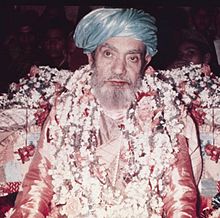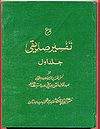- Muhammad Abdul Qadeer Siddiqi Qadri
-
Maulvi Muhammed Abdul Qadeer Siddiqui (Hasrat) 
Born 27 Rajab 1288 Hijri
Hyderabad, Deccan, IndiaOther names Bahr Ul Uloom Allama Maulana Alhaj Mohammed Abdul Qadeer Siddiqui Qadri, Hasrat (Pen Name) Maulvi Muhammed Abdul Qadeer Siddiqui (Hasrat) (1870–1962) (Arabic: محمد عبدالقدير صديقى ) was an Islamic theologian, Qur'anic exegete, poet, and a Sufi of Southern India. Born in the city of Hyderabad, Siddiqi was the first dean of the faculty of Theology of the newly established Osmania University, built by the Nizam VII Osman Ali Khan of the State of Hyderabad. Due to his esteemed knowledge of Islamic Sciences, Siddiqi was always referred to by his peers and followers as Bahr Ul Uloom (ocean of knowledge). He compiled poetry in Arabic, Persian, and Urdu and adopted the pen name of Hasrat. He belonged to a family of many titles, but shunned them away and just referred to himself as " Maulvi Abdul Qadeer Siddiqi" probably because of the appellation of his Shaikh as Maulvi during his childhood.
Contents
Life
Known among his close spiritual disciples as Qadeer Piya or "Qadeer the Beloved", Siddiqi was a descendant of the first Islamic Caliph, Abu Bakr. His ancestors came from Cheenak, a small town near the city of Ahmedabad in the modern day Indian State of Gujrat. Due to the unavailability of the formal schooling in his time, he went on to acquire education through individual spiritual teachers and later passed private examinations from places such as the University of Punjab from where he received the degrees of Maulvi Fazil. His other degrees and diplomas were, Munshi, Munshi Alim, and Munshi Fazil. It is said that at the age of fifteen when he received his first degree of Maulvi, Siddiqi started his career as a Mufti (expounder of Islamic Law) and a teacher of Fiqh (Islamic Jurisprudence). His tenure of service at Osmania University was being extended year to year after the retirement age for ten years. He then did not further get any extension of his service. Though he had some philosophical differences with the Nizam on the technicalities of the social values of the Muslim society of the State, yet the Nizam continued to consult him on important religious matters. He also instructed hundreds of students at his private home. He died in 1962 and is buried in the town of Siddiq Gulshan, Hyderabad. A very high dome is currently being constructed on his grave and is expected to be as high as 117 feet which will be second tallest cupolas in Hyderabad.
His 'urs (death anniversary) is commemorated every year on the 16th, 17th and 18th of Islamic month of Shawwal. A detailed biography titled "ABDULLAH - a servant of Allah" comprising 600 pages is compiled by his grandson (maternally) Maulvi Muhammad Anwaruddin siddique.
Spiritual masters and students
His first Shaikh (spiritual master) was his (maternal) uncle, the legendary, Syed Khaja Muhammad Siddiq Hussaini who had produced many generations of sufi legends like Hazrat Syed Ahmad Ali Shah, Hazrat Syed Mahmood Makki, Hazrat Syed Omar Hussaini, Hazrat Syed Osman Hussaini, Hazrat Syed Yahya Husaaini, Hazrat Abdul Muqtadir Siddiqui Fazl, Hazrat Syed Baqir Hussaini and many more. Shaikh Muhammad Siddiq had many titles but most famous was "Mahbooballah" (Beloved of God). After the death of his Shaikh, Siddiqi who was 24 years old, travelled all over the Muslim world and benefited from the knowledge and wisdom of many other scholars and spiritual doctors. However whenever he said My Shaikh, it meant shaikh Siddiq. He used to say, "My father is Siddiqi (a reference to his ancestor Abu Bakr as-Siddiq) and my shaikh is siddiq. I am a Siddiqi from every angle".
Students
Although he had thousands of students as a professor of theology in Osmania University. His renowned students include Shaik al-Islam Sayyid Muhammad Badshah Husaini who was appointed to address in the grand Makkah Masjid after the Jumu'ah prayers, Muhammad Hamidullah, the internationally acclaimed Islamic scholar who spent much of the rest of his life in France, Dr. Abdul Hafiz Qatil, Professor Ilyas Burney, former Head of Department of Economics at Osmania University, Professor Syed Muhammad and many more.
 Signature of Maulvi Abdul Qadeer Siddiqui,where م denotes Mohammed, ع denotes Abdul, ق denotes Qadeer.
Signature of Maulvi Abdul Qadeer Siddiqui,where م denotes Mohammed, ع denotes Abdul, ق denotes Qadeer.
He had ninety two khulafa' (spiritual successors) under the Qadri-Qadeeri Silsila , during his life time the last one being his grandson Hussain Ataullah Siddiqi. Their followers are in thousands, spread all over the world. Each specialized in at least one branch of art of knowledge. In the USA his Khalifah is his son Ahmed Abdus-shakoor Siddiqui and in Canada his khalifa is his son-in-law, Qazi Ahmed Bashiruddin Farooqui. His present Ja-i Nashin is his youngest son, Hazrat Ghouse Muhiuddin Siddiqi who is about 72 years of age. since 18-july 2011 present ja nasheen is Hafez Abdul Razakh siddiqui grand son and khalifa of hazrath bahr ul uloom rh
His works
Translation of the Quran
Main article: Tafseer-e-SiddiquiHe had started writing a tafsir (Qur'anic exegesis) which was published in the magazine "Al-Qadeer" named after him. When completed, it was printed under the title "Tafseer-e-Siddiqui".
In addition to this completed tafsir, he also compiled separate commentaries focused on the first chapter of the Qur'an "Surat al-Fatihah" titled "Tafsir-e-surat al-Fatihah" as well as the 30th part of the Qur'an Juz' al-'Amm, which was titled as Tafsir-e-Latifi. In this he addressed the womenfolk during the explanation of different verses and hence the word "Latifi" appears in the title.
Poetry
Main article : Kulliyyat-e-Hasrat.
All of his poetry works, whether written in Urdu, Arabic, and Persian, is combined in "Kulliyyat-e-Hasrat".As the title Kulliyyat calls for various branches of poetry are included, Ghazal, Qasidah, Marsia, Nazm, Ruba'iyat. It consists of Hamd, Na'at, Manqabat homage to his Shaikh and other Sufi Saints of his order such as Shaikh Abdul Qadir Jilani and Khawajah Moinuddin Chishti of Ajmer, India.
Other Islamic works
Siddiqi had authored more than fifty books apart from the tafseer-e-siddiqui, most of his Islamic works are in Urdu which include his books on Theosophy (tasawwuf) such as
- "Al-Tawhid", in Persian and translated in Urdu by his eldest son Muhammad Abdul Rahim Siddiqi,
- "Hikmat-e Islamiyyah",
- "Al-'Irfan",
- "Tafhimat-e Siddiqi",
- "Sud ka Mas'alah"
- "Haqiqat-e Bay'at", etc. Siddiqi is also known in the Arab world for his works in Arabic on the science of "Kalam", or 'Dialectical Theology'. His translation of Ibn Arabi's "Fusus-al-Hikam" into Urdu is regarded as the most authentic one and was included in the curriculum of the University of Punjab, Lahore. Also, his compilation of the Hadiths (sayings of the Prophet) explicating the jurisprudential details of the Hanafi School of Law is not based on his personal Ra'y' (opinion) as many think. In fact, he argues that the Hanafi School (madhhab) is totally based on the Quran and the Hadith. This work is titled "Ad-Din" consisting of four sections . 1. Kitab al-'Ilm, 2. Kitab al-Iman, 3. Kitab al-Ihsan and 4. Kitab al-Islam. This was in the syllabus of Osmania University.
Death
Siddiqui was ill for a long time and 15 days before his death, ordered that his grave be dug in 'Siddique Gulshan'. Siddiqui died on 24 March 1962 at 3:45 pm.
See also
- Chishti
- Sufism
- Sufi Saints of South Asia
- Kulliyyat-e-Hasrat
- Qadri-Qadeeri Silsila
External links
- http://www.siddiqgulshan.com/
- http://www.hasrat.com/
- http://www.correctislamicfaith.com/hzabdulqadeersiddiqui.htm
- http://www.cifiaonline.com
- http://www.mahbooballah.com
- http://www.yahyapasha.com
- http://www.mohiacademy.com
- http://groups.yahoo.com/group/Qadeeries/
- http://www.facebook.com/pages/Maulvi-Abdul-Qadeer-Siddiqi-Hasrat-RA/20737804795
Categories:- Chishti Order
- Indian Sufis
- Sufi poets
- Hyderabad State
- Muslim writers
- Muslim scholars
- Indian people of Arab descent
- Indian Sunni Muslims
- Islamic studies scholars
- 1288 births
- 1962 deaths
Wikimedia Foundation. 2010.

